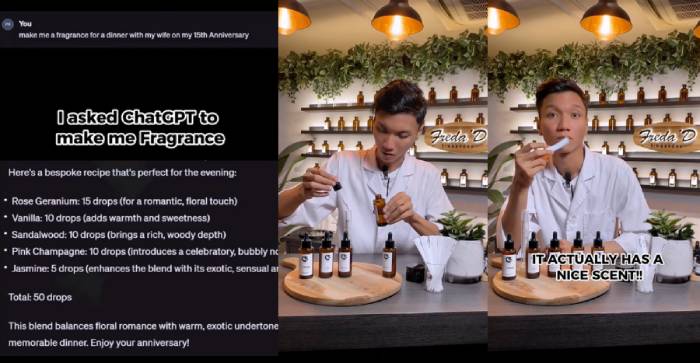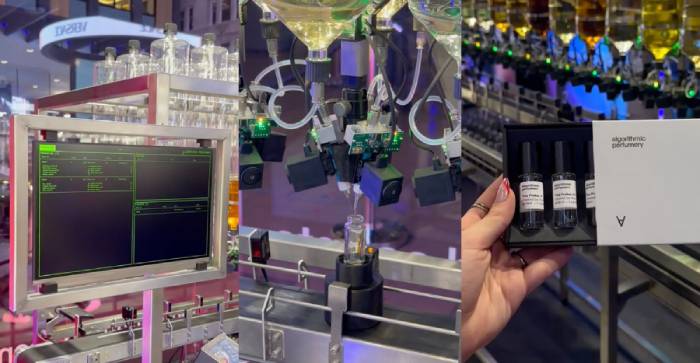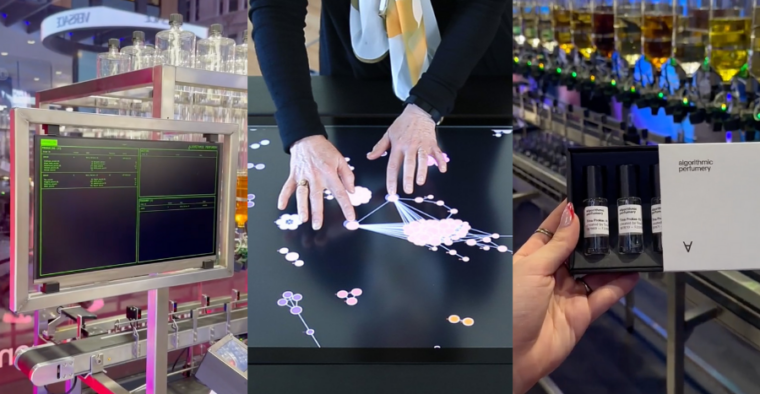The eternal debate of whether robots surpass humans is reminiscent of the age-old question of which came first, the chicken or the egg.
Throughout history, perfumery has been a captivating fusion of science and creativity, an art form that has stood the test of time. From the ancient Egyptians adorning themselves with floral essences to the Romans perfecting the art of distillation, fragrance has always held a significant place in culture.
Each perfume is a narrative, a harmonious blend of carefully selected notes that aim to evoke emotions and memories.
However, the future of fragrance is now at a crossroads. In this era of artificial intelligence, a lingering question arises: can AI ever truly replicate the artistry and expertise of the human nose?
Perhaps, these two forces will discover a way to coexist harmoniously, composing a new symphony of scent.
AI’s Role in Fragrance
For more than seven decades, computer scientists have dedicated their research to exploring the possibility of making a robot’s behaviour indistinguishable from human intelligence.
This pursuit has not only inspired numerous stories and movies depicting the clash between humans and robots but also shed light on the strengths and weaknesses of each side.
Given this extensive exploration, it should come as no surprise that the fragrance industry has now welcomed a new type of collaborator: artificial intelligence.
Related read: Fragrance Trends 2024: Scent Your Way Into the New Year With the Hottest Notes and Perfumes
The Pros of AI for Perfumers and Fragrance Brands
@fredadparfum What should we ask next? 🤔 Let us know in the comments! Curious how it actually smells like? Book your workshop with us now to make it yourself! OR even, come on down and ask the Freda’D AI yourself and create your very own scent assisted by AI 🙊🙊 #ai #perfumetiktok #chatgpt #fragrance #aiperfume #perfumetiktok
AI’s real power comes from its lightning-fast number-crunching abilities. For instance, tools like Philyra from Symrise function as a digital assistant, sifting through extensive databases of existing perfumes, their components, and even consumer preferences.
The traditional method of creating fragrances requires multiple steps and teamwork among different departments, such as perfumers, evaluators, sales, and marketing, to craft scents based on client specifications.
This procedure can be lengthy, involving multiple revisions until the client is content. Nevertheless, the integration of AI-powered tools aims to simplify this process, making it more effective and decreasing the need for human involvement.

Credit: @fredadparfum/TikTok
AI is capable of recognising patterns, suggesting unique ingredient combinations, and quickly creating them.
Picture a perfumer trying out numerous combinations instantly — AI turns this into a possibility, speeding up the creation of innovative fragrances.
“We could have used AI to help us with technical issues, like creating more powerful, stable or commercial fragrances, but from the genesis of the project, Philyra has been designed to be a creativity booster.
Thanks to the algorithm, AI is pushing the limit of creativity by pushing the perfumer out of their comfort zone and away from their daily routine. By adding more of an ingredient, proposing an unconventional accord or twisting the fragrance in an unorthodox way, Philyra helps us to discover and explore new olfactive territories.
It’s a constant back-and-forth between human and computer, to create each new and innovative olfactive profile,” shared Pierre Gueros, Symrise Senior Fine Fragrance Perfumer.
Related read: Here’s How You Can Layer Fragrances to Create a Unique Scent, According to Arabic Perfumers

Credit: Givaudan. Carto: Givaudan Fragrances’ sensory innovation
There are also platforms like Carto by Givaudan which was spearheaded by Calice Becker, vice president perfumer at Givaudan, director of Givaudan Perfumery School in Paris, and the nose behind Dior’s J’Adore.
Based on what Calice shared with Allure, AI-powered tool Carto can instantly produce fragrance samples and expand the perfumer’s palette to nearly 5,000 ingredients worldwide (surpassing the human capacity of 1,000 to 2,000).
With these complex algorithms, perfumers can formulate fragrances based on their initial concept or explore entirely new ingredient combinations that were previously unthinkable. Not to mention, they’d save tons of time on the development process, from ideation to testing and creation.
Comparable to ChatGPT in fragrance development, Carto can whisk up “quick and dirty” fragrance sketches or ready-to-launch fragrances. The company cited She Was an Anomaly by Etat Libre D’Orange as an example.
Another upside of employing AI in fragrance creation is that wellness is at the forefront of these innovations.
eScent, a wearable-tech brand, is utilising AI to enhance the mental well-being of individuals. By detecting stress levels, their AI-powered device dispenses a customised scent, improving the user’s state of mind.
With AI occupying so much of our fascination, even in the world of perfumery, where does that leave us for the future of perfumes? Can AI really replace perfumers?
The Art of the Human Nose

Credit: Depositphotos
To really answer these questions is to really scrutinise the essence of what it means to be human.
I remember reading The Creativity Code: How AI is Learning to Write, Paint and Think by Marcus du Sautoy and being incredibly enamoured yet frightened by AI’s capabilities.
AI is effortlessly writing and creating art for us but it can’t quite replace the storytelling, the adventurous memories, the feeling of excitement and discovery, and that level of complexity especially when emotions are involved.
The prospect of using AI tools for perfumery is very exciting, as denoted by Carlos Huber, an independent fragrance developer and founder of Arquiste.
He expressed that there is huge potential to form a future of very refined, precise perfumery but AI “will never substitute a perfumer or fragrance designer fully” as “it will always lack the human touch”.
Related read:17 Best Perfumes for Malaysian Men to Smell Good in 2024
Invaluable Skill and Expertise

Credit: Depositphotos
AI is revolutionising the conventional approaches to fragrance exploration and production in the field of perfumery, shaking up the long-standing norms within the sector.
Perfume creation has been the domain of skilled human perfumers like Anne Flipo (responsible for Lancôme’s La Vie Est Belle and YSL’s Libre), Dominique Ropion (responsible for Frédéric Malle’s Portrait of a Lady and Paco Rabanne’s Invictus), and Rodrigo Flores-Roux (responsible for Clinique’s Happy and Tom Ford’s Neroli Portofino) — all known for crafting iconic scents.
These experts rely on their mastery of ingredients, composition, and sense of smell to create unique fragrances.
A master perfumer have had years of experience in honing their sense of smell; their trained nose can distinguish how notes interact in reality.
They can identify imbalances, adjust ratios, discern the subtlest nuances between notes, and ultimately refine the fragrance into a cohesive and emotionally resonant whole.
Now, AI and robots don’t quite have reputable noses or the ability to smell, do they?
Lack of Emotive Layers

Credit: Depositphotos
Despite the remarkable abilities of AI in generating captivating formulas and suggesting fascinating possibilities, the human sense of smell remains indispensable in the realm of perfumery.
While AI offers numerous advantages and enhanced productivity, it is not exempt from limitations and obstacles.
Undoubtedly, AI can assist in analysing scent profiles, but it falls short in replicating the intricate comprehension of how these fragrances intertwine and elicit emotions in individuals.
Ultimately, perfumers are renowned for their unparalleled talent in translating emotions and concepts into olfactory encounters.

REPLICA by Maison Margiela. This collection lets you relive personal memories through scents.
This artistry goes beyond simply combining scents; it’s about capturing a feeling, a memory, or a specific mood in a bottle.
So, yes, AI does serve as a powerful tool to spark creativity and broaden possibilities, but the human perfumer remains the artist who breathes life, emotion, and artistry into the final scent.
Related read: This White Rabbit Candy Perfume, Hand Cream, and Lip Balm Set is Giving Us Major Nostalgia!
Consumer Perspectives and What People Are Saying
@tinaprokas Would you wear a fragrance that AI made you? 🤔 It’s located inside @The Fragrance Shop #fragrancetiktok #thingstodoinlondon #aiperfume #thefragranceshop
AI has certainly been accepted rather wholeheartedly in the skincare and makeup worlds. We see personalised skincare and robots that can find your perfect foundation shade.
Where does AI come into play in the world of perfume?
The consumer perspective on AI-designed fragrances is still evolving. Some might be intrigued by the idea of a fragrance tailored to their specific preferences, thanks to AI’s data analysis capabilities.
Imagine a perfume that perfectly captures your ideal “summer day” scent or complements your unique body chemistry!
Amplify, Rather Than Replace

Credit: Depositphotos
The success of AI in the perfume industry depends on the transparency it offers and the effort put into educating consumers.
It is important to acknowledge that AI enhances creativity rather than replacing it, as this is vital in establishing trust with consumers and harnessing the full potential of AI-driven fragrances.
Nevertheless, the idea of a scent solely designed by AI may raise concerns for certain individuals.
Fragrances are often associated with personal memories and emotions, which may lead to reservations towards scents created solely by algorithms, lacking the human touch and the narratives behind traditionally crafted perfumes.
According to Maison 21G founder Johanna Monange in Fashion Magazine, it’s crucial to strike a balance between technology and human creativity.
“AI should amplify the creative process rather than replace it. There’s a risk of homogenisation if AI algorithms are used excessively, which could result in a loss of diversity and uniqueness in fragrances,” said Johanna.
Meanwhile, Ashley Boyce, co-founder of Noteworthy, noted: “Ultimately, all these AI tools are being used to raise the bar when it comes to the perfume experience and better meet customers’ expectations. But it’s up to each individual to choose a fragrance they love and that works for them and their body chemistry; this is something that AI really can’t replace — it can only complement the experience.”
Additionally, with the growing emphasis on natural ingredients in beauty products, some consumers might prioritise “natural” scents over those potentially formulated with AI-discovered synthetic ingredients.
Related read: Chloé Fragrances Has Opened Its First Ever Boutique in Malaysia, Offering a Range of Amazing Scents!
More AI-powered Perfumers?

Credit: Google Research Blog
In late 2022, AI expert Niko Groeneweg (Hiringly.ai and La French Tech) took to LinkedIn to share his thoughts on the rise of AI-powered perfumers and “how AI will eat the perfume industry”.
He elaborated that much of the work perfumers do in the lab (trying out new combinations of molecules and creating new fragrance profiles) could be enhanced by tools like Google’s Odor Map.
Givaudan and other leading fragrance composition companies understand the significance of innovation in their industry and have made substantial investments in AI-powered tools to elevate the creative process for perfumers.
However, these tools, while advantageous in improving outcomes and gaining a competitive advantage, depend on exclusive technology and datasets, which makes their development expensive.
Consequently, they create a hurdle for new companies aiming to enter the market and establish effective competition.
However, Niko stated that “AI technologies like Google’s Odor Map do the exact opposite: they lower the barrier of entry for the perfume industry.”.
“While today only the most profitable composition houses can afford to be AI-driven, tomorrow any company – even a tiny startup – will be able to enhance their creation process with the latest AI breakthroughs.”
Niko does not doubt that Google’s Odor Map heralds the coming of a generation of AI-powered perfumers and imagines a world where AI will allow us to generate fragrances the same way it already allows artists to generate art — by simply telling the computer what they want!
AI and the Future of Fragrances: Friend or Foe?

Credit: Depositphotos
So, where do you stand in this debate — with technological advancements or one of our own talents?
With the progression of AI in various aspects of our lives, it’s expected to have a greater impact on scent development and could even influence the success of a fragrance.
But creating scents is a very personal and subjective process. While AI can assist in the process, crafting truly unique and groundbreaking fragrances still requires a human touch that technology may not be able to fully replicate.
The debate on AI versus human perfumers is far from settled. In fact, I have to say, the general result or consensus is almost always the same.
The future of fragrance lies not in a battle between human and machines but in a beautiful symphony of their combined strengths.

Credit: @tinaprokas/TikTok
AI’s analytical prowess can unlock endless possibilities for novel combinations and accelerated development but it’s unable to offer a human perfumer’s power to craft olfactory masterpieces doused in actual emotions.
Perhaps the future lies not in a battle for dominance but in a beautiful collaboration. AI can spark boundless creativity, while human artistry ensures emotional resonance.
The possibilities are endless, and the future of fragrance, fueled by the combined power of human and artificial intelligence, promises to be a truly fragrant one.
Related read: 15 Top “Gen Z Fragrances” and What the Wild, Boundary-Breaking Bunch Look for in Perfumes
Featured image credit: @tinaprokas/TikTok, Givaudan

